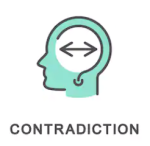There was a time when people understood that knowingly holding to contradictory beliefs was immoral. Philosophers and theologians alike strove to present logically consistent systems of thought devoid of any contradictions between their constitutive propositions. With postmodernism’s essentialist declarations concerning anthropology, language, morality, and epistemology, however, contradiction has come to be viewed, ironically enough, as an essential part of human intellection. Systems of thought that purport to be contradiction-free, consequently, are judged to be either hopelessly philosophically naive or arrogant and dishonest. And this, of course, includes religious systems of thought.
Accordingly, the contemporary non-religious world views Christianity as naive and/or dishonest because it asserts that it and it alone is true. Within many professedly Christian churches, the same sentiment is directed against those who assert that certain doctrines are foundationally true, such that a denial of these doctrines indicates that one is lost. Whereas the world demands that Christians abandon our uniqueness and let religious bygones be bygones, many in professedly Christian churches demand that we abandon orthodoxy and let doctrinal bygones be bygones.
In both instances, what is being embraced is the postmodern idea that contradiction is inevitable, even in the pages of God’s Word. Additionally, what is implicitly embraced is the conviction that contradictions, in fact, are good, seeing as they push forward a progressively unfolding and expanding theological dialectic which will never resolve in this life. This open-ended dialectic is seen as the means whereby Christians may be epistemically humbled and led to soften their tone regarding the core doctrines of Christianity.
But Scripture doesn’t support this view of contradictions. In fact, Scriprture consistently teaches that contradictions are evil, wicked. For instance, consider what Paul says in 2nd Cor 1:17 –
Was I vacillating when I wanted to do this? Do I make my plans according to the flesh, ready to say “Yes, yes” and “No, no” at the same time?
In this passage, Paul explains that saying yes and no at the same time, and in the same sense, is not morally neutral, it is according to the flesh, or carnal. It is to be, in essence, what James calls “double-minded” in James 1:5-8. He writes –
If any of you lacks wisdom, let him ask God, who gives generously to all without reproach, and it will be given him. But let him ask in faith, with no doubting, for the one who doubts is like a wave of the sea that is driven and tossed by the wind. For that person must not suppose that he will receive anything from the Lord; he is a double-minded man, unstable in all his ways.
Such self-contradictory thinking renders us unstable, unable to think and act in accordance with the truth. Self-contradiction is part and parcel of what is not knowledge at all. In 1st Tim 6:20 Paul writes –
O Timothy, guard the deposit entrusted to you. Avoid the irreverent babble and contradictions of what is falsely called “knowledge…”
Contradictions, then, are neither profound, enlightening, good, spiritual, or godly. Rather, contradictions are carnal.
WHO CARES?
Some may ask why it is important to point out that contradictions are carnal. There are many reasons we can give, but the following three are among the greatest.
False teachers are bitterly opposed to clear thinking. If a teacher trades in contradictory statements regarding his doctrine or his personal life (e.g. whether he is or is not involved in a given sinful relationship or behavior), then we may properly identify him as, at the very least, a threat to the stability of the church. At worst, he is an enemy of God and his church who must be publicly rebuked, renounced, and removed from the pulpit. In either case, he is unfit for the ministry of the Word and should be avoided.
Understanding that contradictions are to be eliminated from our thinking will cause us to be more cautious in our doctrine and in our life. The goal of being without any contradictions in our thinking should lead us to strive toward that end, knowing that being consistent in our thinking is not an empty academic exercise but an exercise in godliness.
Contradictions are false, and we are to be people of the Truth, who believe the truth, and who are led by the Spirit of Truth to walk in the way of truth.
In regeneration, we are given the mind of Christ. Let us be conformed by his Word to think as he does – without contradictions.


